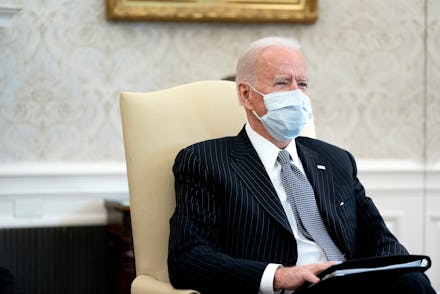So, am I getting a stimulus check or what?

Despite the mountains of evidence that direct cash payments save lives, elected leaders in Washington, D.C., are still squabbling about who exactly should receive checks, as well as how much those checks should be for. The details around stimulus checks keep changing, due in part to the inconsistent messaging from those at the top.
President Biden campaigned on a promise of delivering $2,000 checks to eligible Americans. Then, after he introduced his $1.9 trillion economic stimulus package, we learned that the checks would actually be for $1,400 — piggybacking off the second direct cash payment offered in December of $600 to make a combined $2,000.
Together, the two checks do technically adhere to Biden's campaign promise, but it's quite a stroke of political manipulation. And either way, U.S. residents are in need of a whole lot more money than that to weather the remaining months of the pandemic.
Biden is now waffling on the details about who is eligible for stimulus checks, a move that kowtows to Republican demands to shrink the overall size of the stimulus package. "We can't walk away from an additional $1,400 in direct checks that we proposed because the people need them," Biden told Democratic leaders on a call, per The Hill. "We can better target [the checks]," Biden said, seemingly referring to adding restrictions on what income levels would be eligible, "but I’m not going to start my administration by breaking a promise to the American people."
White House Press Secretary Jen Psaki attempted to clarify the president's remarks, saying that "further targeting means not the size of the check, it means the income level of people who receive the check, and that's something that has been under discussion. There hasn't been a conclusion, but certainly he's open to having that discussion."
Biden met with Democratic leaders in the Oval Office on Wednesday. After the summit, Senate Majority Leader Chuck Schumer (D-N.Y.) told reporters that Democrats would not compromise with Republicans on the issue of checks. "We want to do it bipartisan, but we must be strong. We cannot dawdle, we cannot delay, we cannot dilute, because the troubles that this nation has and the opportunities that we can bring them are so large," Schumer said, per NPR. But not everyone wants to wade through the issue of stimulus checks in a bipartisan way. Sen. Bernie Sanders (I-Vt.), for instance, has insisted that direct checks, regardless of income, are critical. Progressive House Democrats have also pushed the Biden administration for recurring stimulus checks.
The conflicting messaging — and the lack of specifics — is typical politics, taking a seemingly simple principle and making it complicated. As Mic pointed out recently, direct cash checks are good for the economy, prevent the poverty rate from increasing, and keep people in their homes. So arguing over semantics is really missing the point.